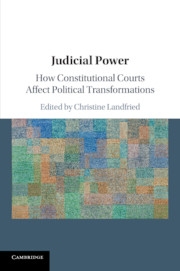Book contents
- Judicial Power
- Judicial Power
- Copyright page
- Contents
- Contributors
- Acknowledgments
- Introduction
- Part I Democratic Legitimacy of Judicial Power
- 1 Judicial Power and Democracy
- 2 Judicial Politics versus Ordinary Politics
- 3 Judicialization of Politics or Politicization of the Courts in New Democracies?
- 4 European Judicial Appointments Reform
- 5 The Law of Democracy and the European Court of Human Rights
- Part II Democratic Effectiveness of Judicial Power
- Part III Legitimacy, Effectiveness, and Judicial Methods of Decision-Making
- Part IV Judicial Power in Processes of Transformation
- Index
1 - Judicial Power and Democracy
from Part I - Democratic Legitimacy of Judicial Power
Published online by Cambridge University Press: 27 January 2019
- Judicial Power
- Judicial Power
- Copyright page
- Contents
- Contributors
- Acknowledgments
- Introduction
- Part I Democratic Legitimacy of Judicial Power
- 1 Judicial Power and Democracy
- 2 Judicial Politics versus Ordinary Politics
- 3 Judicialization of Politics or Politicization of the Courts in New Democracies?
- 4 European Judicial Appointments Reform
- 5 The Law of Democracy and the European Court of Human Rights
- Part II Democratic Effectiveness of Judicial Power
- Part III Legitimacy, Effectiveness, and Judicial Methods of Decision-Making
- Part IV Judicial Power in Processes of Transformation
- Index
Summary
- Type
- Chapter
- Information
- Judicial PowerHow Constitutional Courts Affect Political Transformations, pp. 21 - 35Publisher: Cambridge University PressPrint publication year: 2019
- 2
- Cited by



